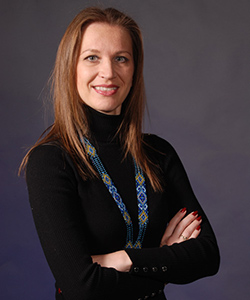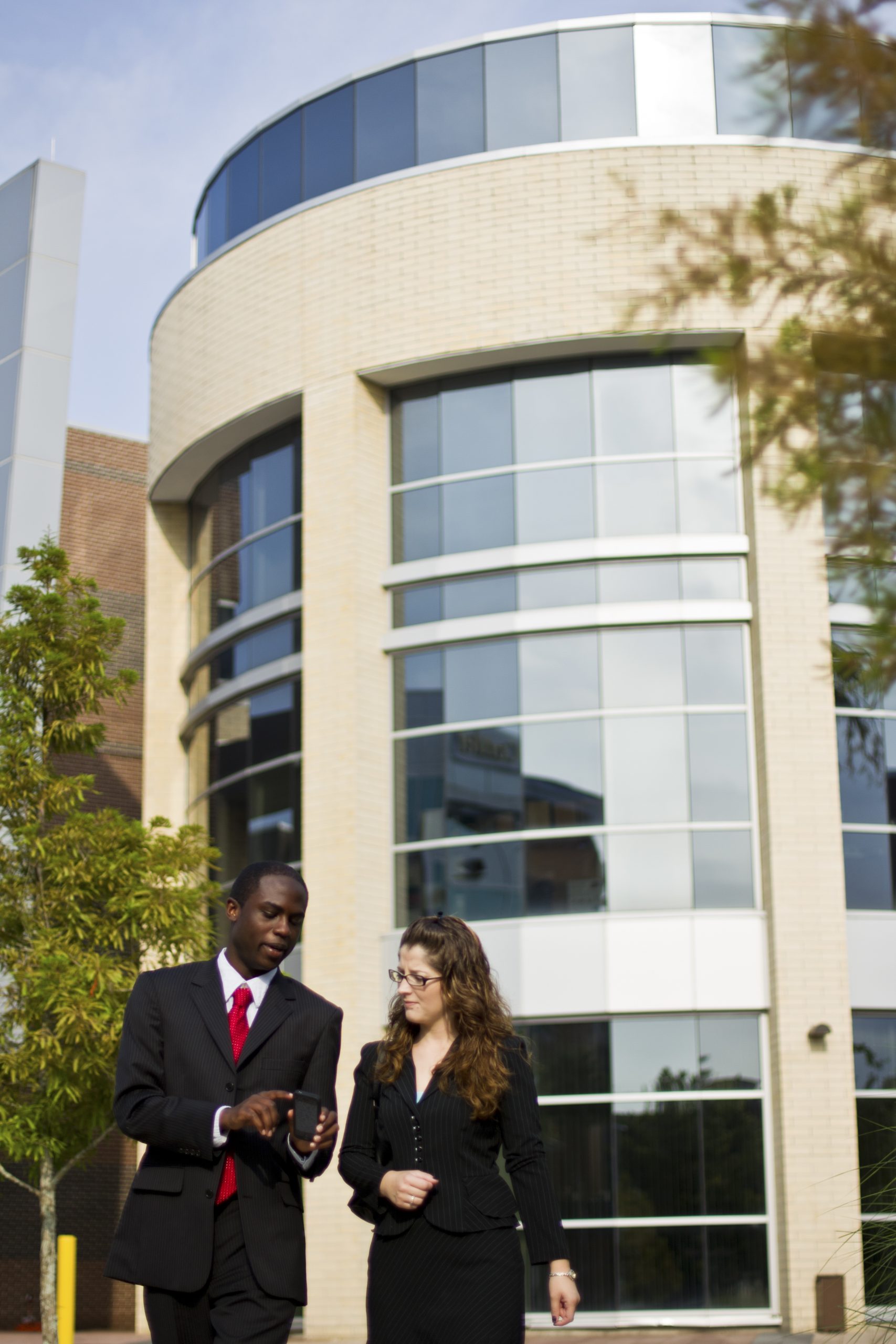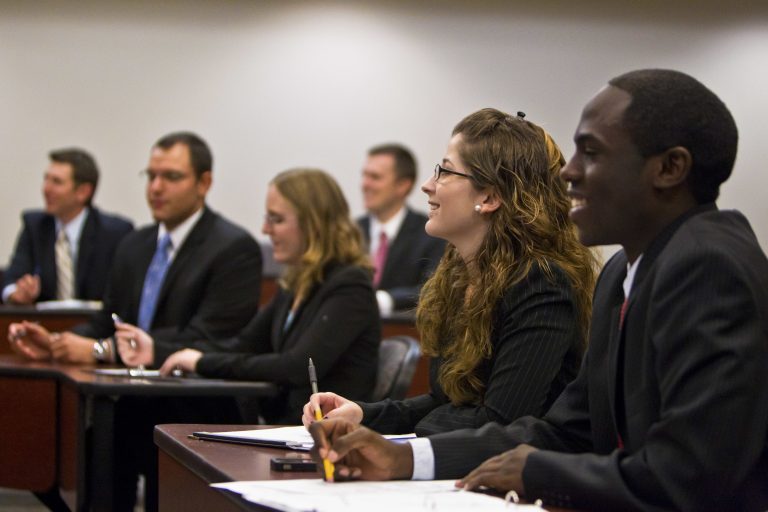What do Students Learn from Attending a Career Conference?
What do Students Learn from Organizing One?

Iryna Malendevych, M.S.
Associate Instructor
Criminal Justice
What?
Conferences are an integral part of student academic and professional growth and attending those have a positive impact on their career development. For some, it provides a chance to improve their leadership skills. Other students strengthen their knowledge about the field and interact with professionals during panel sections, deepen their knowledge on unique requirements of the employment process, gain inspiration from experts that share the same interests, and network with professionals during the career fair part of the event. It is also a great place to secure professional contacts and even an internship.
To complement classroom activities, a daylong student conference was designed. It is organized by a group of students, from its initial planning to cleaning after it ends. Students of criminal justice and related majors attend the conference, which includes a key-note speaker, several career-related workshops/professional panels and a career fair. This conference provides students with an invaluable opportunity to connect with recruiters/hiring managers which consequently helps students acquire relevant experience while in school.
In Spring 2020, the Criminal Justice and Public Service Conference celebrated its 4th year of success. Over 140 students attended the conference and networked with over 40 Criminal Justice agencies from all levels of government, private security industry, and non-profits organizations.
The logistics of the conference are transferrable to any field.
How It All Started
A little over 4.5 years ago, my former student and I had a career discussion; even with the highest GPA, numerous impactful projects, part-time employment, the student still had doubts at what to do after graduation. A 4 by 6 postcard marketing a Florida International University’s Federal Government Statewide Conference event piqued our curiosity, and after consulting with the career services liaison, we got into a tiny rental Ford and off we went to Miami the very next week. We spent a day with the organizers, attending agencies and students. It was on our way back that the idea of the Criminal Justice and Public Service conference was first discussed. It followed by the summer of securing funding through grants, and then Fall planning.
We held our 1st Annual Criminal Justice and Public Service Conference on February 17th, 2017.
Why?
To meet the following goals:
- Establish a comprehensive program to expand University commitment to provide the best education
- Strengthen opportunities to enhance student development and success
- Create a comprehensive leadership development program
- Enhance student opportunities for experience-based learning
- Expand civic engagement opportunities
According to the 2014/2015 UCF First Destination Data, approximately, 23% of recent UCF graduates work or plan to work in the public service sector. Applying this figure to the current student population, it is likely that more than 14,000 current students would be interested in working in the public sector. Criminal Justice comprises a large part of the public sector in addition to having a large representation of criminal justice careers within the private sector.
The project also aligns well with the mission of UCF’s QEP, What’s Next—to prepare undergraduates to successfully enter and participate in the next steps of their post-graduation professional and civic lives. The content supports desired QEP student learning outcomes: (1) guidance and information, (2) high-impact integrative learning experiences, and (3) meta-cognition and self-advocacy.

In 2020, for the 4th year, we welcomed over 40 organizations from federal, state, and local government as well as organizations from the nonprofit and private security industry sectors; many of those are very familiar to all, but there are some that students are unaware of. One of the greatest joys was to see our alumni representing agencies and companies, some of them noted that they secured their internships, and later, full time employment during earlier annual conferences.
The CJPS conference will continue serve as a foundation to any student with an interest in pursuing a career in the criminal justice field. Its standards are upheld by young leaders who continue its tradition; its success is driven by professionals in the field with a desire to help young minds discover new career aspirations and opportunities available to them. I am honored to have been able to serve as both, an organizer and agency representative. ~ Milena Canete, the first student organizer, former LAE President/HIDTA

What I learned from the Criminal Justice and Public Service Conference this Spring was the importance of networking and how best to do so. I learned to ask as many questions as I can and to carry myself with confidence. I also learned that professionalism takes you a long way; the more professional you are, the more respect you will receive and the more memorable you will be. ~ Madison May, Criminal Justice Student, Junior
What is in it for the Students?
- Broaden their awareness of career opportunities abroad
- Expand their awareness of career opportunities in federal, state, and local government, as well as opportunities in public service organizations from the nonprofit and private sectors
- Promote student career readiness and receive employment leads for a full-time, part-time, internship, and volunteer positions
- Learn the importance of starting their job search early (prior to graduation) and will gain the tools needed to succeed in the job search
- Identify one connection between their coursework and the represented employment opportunities
- Provide numerous leadership and learning opportunities for the organizers
What is in it for the Agencies/Organizations?
- Develop new community partnerships with faculty, students, and employers
- Advance students in their hiring process for a full-time, part-time, internship, and volunteer positions
- Indicate their satisfaction with the number and quality of students in attendance
- Free food! (To serve as excellent hosts, it is necessary to provide refreshments to the professionals who are taking time out of their day to help UCF students.)
Thank you for getting us in from 49 agencies, and over 500 people at the Criminal Justice and Public Service Conference held at UCF yesterday. We had the opportunity to further outreach with other Law Enforcement as well as meeting with possible interns ~The Keri Anne DeMott Foundation, participating agency

The Planning
The conference is organized and run by the student organization, Lambda Alpha Epsilon in the Spring semester. The planning starts a year in advance with the venue reservation (two dates: a priority date and an alternative date). Then, the organization’s executive board meets and discusses a rough draft of the budget (from one year to another it gets easier as the future conference’s budget is worked from the previous year’s budget). Securing the SGA’s funding for the conference is also carefully planned: promotional funding and food funding come in one grant which cannot be altered after it is funded. The student organization raises additional monies needed to run the event. All (or at least the majority) of advertisement materials should be completed at that time as well.
Then, after some quiet time, starts a busy time of the planning in the mid of Fall semester. The students split into a few organizational committees: the logistics team takes care of the venue for both, the career part and workshops/panel part including an arrangement for needed equipment, registrations for the students and agencies/organizations via Evite, prepare attendees folders with the conference materials, and then, operate the check-in tables. The same committee is responsible for securing a keynote speaker. The catering committee manages breakfast and lunch from exploring options on the everchanging list of approved vendors to ordering and processing payments to delivering those to the students and organizational representatives. Workshop/panel committee plans the number of breakout sessions, topics, recruits panelists and workshop leaders, prepare moderator’s questions, and communicate with the chosen panelists/guest speakers. The committee creates and prints the conference agendas.
I have attended the CJPS conference since my freshmen year at UCF. This year, the CJPS conference gave me even more amazing opportunity. It allowed me to gain experience in planning a large-scale event with multiple moving parts and gave me a plethora of professionals in my field to network with. Having to adapt to problems that arose the day of and keep attendees and agencies/ representatives from knowing any different was a feat. It was nice having great advisors’ guidance, a sting executive board, and a cooperative membership! Additionally, the conference allowed me to further my professional network and learn more about the different options I had available in my career. Participating and being involved in this conference is the best way to get your name out to different organizations to best plan for future endeavors. ~ Ayla Todriff, Senior, LAE President

The Day Prior to the Conference
A lot of running, checking and double-checking go on that day. The whole team comes together to go over all and everything from double-checking the venue, following up on all orders/deliveries, volunteer management, etc. A lot of last-minute printing and participants’ folder with the conference materials preparation goes on this day.
The Day of the Conference
The students arrive an hour early for a short “prayer” that all goes well. Then, each team goes and takes care of their respective tasks (for example, the logistics team would set up and run the check-in/on-site registration tables; the parking volunteers will meet agencies’ representatives in the reserved parking and help them carry their promotional materials to the venue, catering team will be setting up a breakfast table, receive and verify the order from the vendor, and monitor for its cleanliness).
Both student attendees and organizational representatives will take a survey at the conclusion of the conference. The questions in the survey will align with the conference learning outcomes in order to determine the effectiveness of the conference.
After the Conference
The whole team stays to collect all items that were brought in for the conference and clean the venue. An initial debriefing meeting occurs on the day of the conference with the longer and more formal meeting within a week to identify mishaps and create a list of ‘improvements/considerations’ for the next year. Survey analysis is used to make changes to future conferences.
In 2021, the conference was conducted virtually via Zoom. The Slack communication platform was used to organize the conference and disseminate all conference information and agencies/organizations/companies’ materials to the students (e.g., business cards, pamphlets, applications, YouTube links, websites, etc.). Video tutorials on how to use Slack and Virtual Conference Etiquette and Expectations were created.

The CJPS conference definitely shaped me as a professional. It helped me become more comfortable talking with those of higher authority, asking important questions and networking with those who might be my future employers and co-workers. I also feel that the conference showed me that leadership isn’t about being the loudest in the room and leaders can be built regardless of how small or different responsibility one has. This conference is an amazing event and I cannot wait to attend more in the future and maybe even come back as a representative for an agency one day! ~ Vanessa Goas, Criminal Justice Student, Junior
The Role of the Faculty Advisor
The faculty advisor oversees operations of each committee and advises (provides suggestions if needed) each committee on their work. In no way, the faculty advisor takes a leading role in event planning. On the day of the event, the faculty advisor is present at all times, speaks with the agencies’ representatives and always promotes the fact that the conference was organized by the students. On the day of the conference, the faculty advisor seeks informal feedback from the guests and collects updated information on the agency, any job/internship position openings, as well as solicits recommendations for the next year’s conference.
The Role of the Department
The role of the department has always been to support the student event in any way (from sending mass informational e-mails to lending easels or table clothes and sometimes even ‘eating the cost’ of the odd items needed in the last minute).
It is the Criminal Justice Department’s privilege to be the home for one of the largest and most active pre-professional student organizations, Lambda Alpha Epsilon.
As an adjunct instructor and as a full-time law enforcement officer, every year I strongly recommend my students attend the CJPS conference. It gives them access to professionals that work in many different criminal justice related fields and hear differences between agencies of the same field. It also allows students to showcase the knowledge they learned in their courses, and practice professional networking. Many of my students enjoyed the experience and found the conference to be extremely beneficial. ~ Bruce Vail, Adjunct Instructor/OCSO